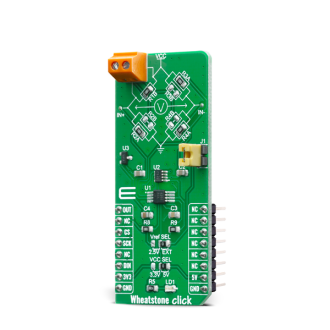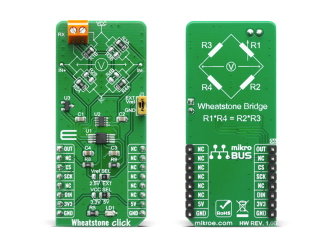
We strongly encourage users to use Package manager for sharing their code on Libstock website, because it boosts your efficiency and leaves the end user with no room for error. [more info]

Rating:
Author: MIKROE
Last Updated: 2020-07-02
Package Version: 1.0.0.0
mikroSDK Library: 1.0.0.0
Category: Power supply
Downloaded: 3784 times
Not followed.
License: MIT license
Wheatstone Click is a measurement Click board which utilizes a Wheatstone bridge circuit onboard, in order to precisely measure the resistance of an external element. Besides the wheatstone bridge circuit, this Click board also utilizes MAX4208 – an ultra-low offset/drift, precision instrumentation amplifier, from Maxim Integrated.
Do you want to subscribe in order to receive notifications regarding "Wheatstone click" changes.
Do you want to unsubscribe in order to stop receiving notifications regarding "Wheatstone click" changes.
Do you want to report abuse regarding "Wheatstone click".


Library Description
The library contains basic functions for working with Wheatstone click.
Key functions:
float wheatstone_get_voltage ( uint16_t adc_value ) - Get Voltagevoid wheatstone_set_adc_vref ( float vref ) - Set ADC VREFvoid wheatstone_set_adc_resolution ( float res ) - Set ADC resolutionExamples description
The application is composed of three sections :
void application_task ( )
{
char demo_text[ 50 ];
float voltage;
uint32_t adc_value = 0;
adc_value = wheatstone_adc_read( );
IntToStr( adc_value, demo_text );
mikrobus_logWrite( "-- ADC value: ", _LOG_TEXT );
mikrobus_logWrite( demo_text, _LOG_LINE );
voltage = wheatstone_get_voltage( adc_value );
FloatToStr( voltage, demo_text );
mikrobus_logWrite( "-- Voltage: ", _LOG_TEXT );
mikrobus_logWrite( demo_text, _LOG_TEXT );
mikrobus_logWrite( "mV", _LOG_LINE );
mikrobus_logWrite( "---------------------", _LOG_LINE );
Delay_ms( 2000 );
}
Other mikroE Libraries used in the example:
Additional notes and informations
Depending on the development board you are using, you may need USB UART click, USB UART 2 click or RS232 click to connect to your PC, for development systems with no UART to USB interface available on the board. The terminal available in all MikroElektronika compilers, or any other terminal application of your choice, can be used to read the message.